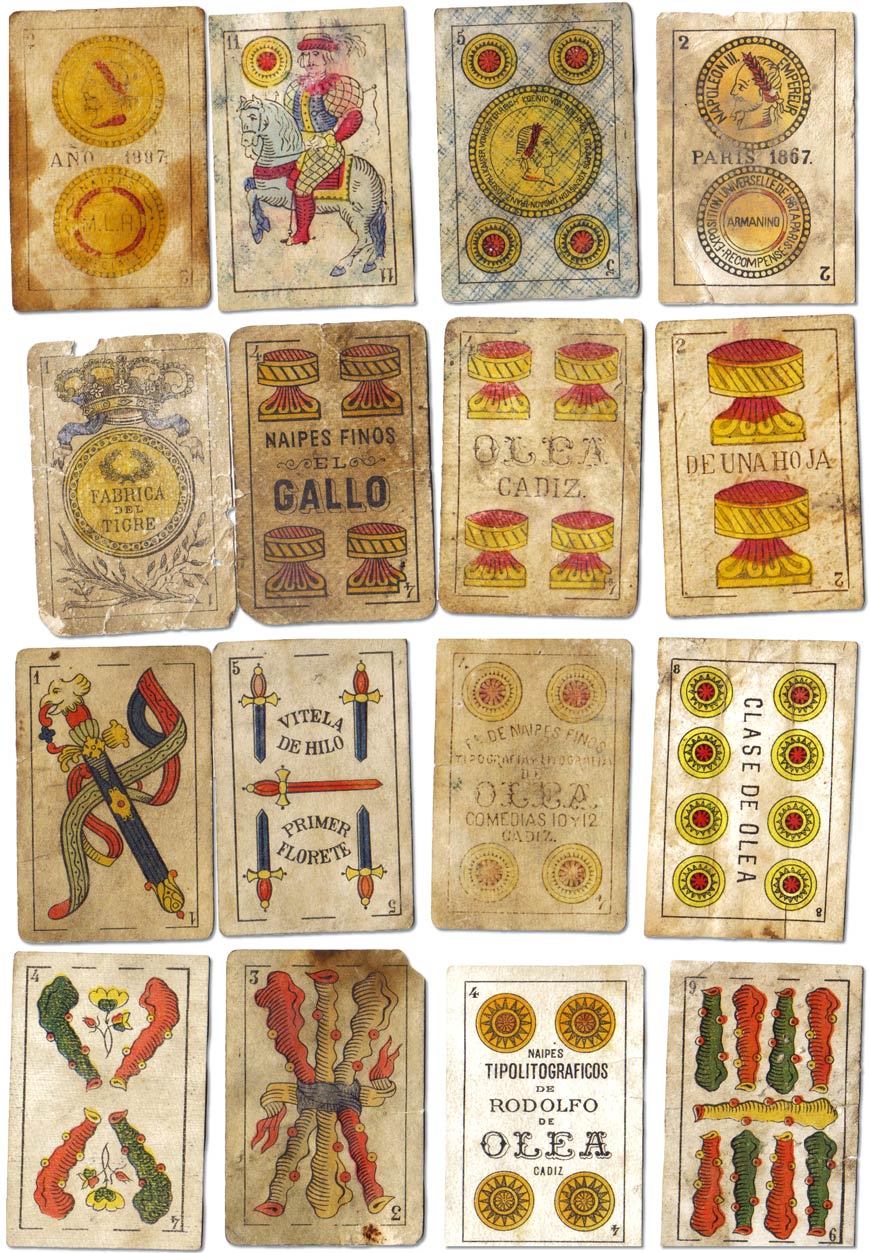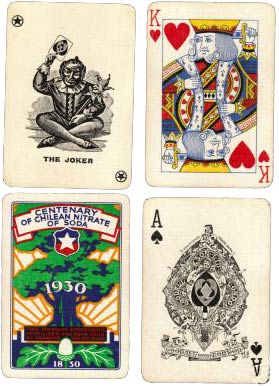Naipes del Salitre
Playing cards recovered from the Northern Chile saltpetre workers. The cards are mostly from Spanish 'Cadiz' pattern decks, and several manufacturers can be identified.
Playing cards recovered from the saltpetre workers from Northern Chile, 1850-1940.
“En el norte de Chile hay dos historias que marcaron una época importante, la historia del salitre que data de 1850 hasta 1940, esto significó un asentamiento de miles de personas que vivían en situaciones precarias y su forma de pago mensual era con fichas, estas eran de vaquelitas, y solamente se transaban en la misma oficina salitrera. En el año 1900 fuerón abolidas por el gobierno chileno y el pago a los trabajadores era con moneda nacional, pues bien para entretenerse lo hacian através de los naipes los cuales yo los he estado coleccionando por varios años, estos tienen fecha de 1867 hacia adelante. La segunda importante sería la guerra del pacífico entre Chile y Bolivia.” - Chilean collector.

Above: assorted playing cards recovered from the rubbish bins in the old saltpetre works in Northern Chile. The workers endured hard living conditions and their main form of recreation was playing cards. The cards shown here are mostly from Spanish 'Cadiz' pattern decks, and several manufacturers can be identified. Inscriptions on the cards include: "M.L.R.", "Armanino", "Fabrica del Tigre", "Naipes Finos El Gallo", "Olea Cadiz", "Tipografía y Litografía de Olea, Comedias 10 y 12, Cadiz" and "Naipes Tipolitograficos de Rodolfo de Olea Cadiz". This indicates a preponderance of cards imported from Spain and Italy.

Right: cards from a pack manufactured by Goodall & Son, Ltd, London, commemorating the Centenary of Chilean Nitrate of Soda (Saltpetre) production, 1930.

By Simon Wintle
Member since February 01, 1996
I am the founder of The World of Playing Cards (est. 1996), a website dedicated to the history, artistry and cultural significance of playing cards and tarot. Over the years I have researched various areas of the subject, acquired and traded collections and contributed as a committee member of the IPCS and graphics editor of The Playing-Card journal. Having lived in Chile, England, Wales, and now Spain, these experiences have shaped my work and passion for playing cards. Amongst my achievements is producing a limited-edition replica of a 17th-century English pack using woodblocks and stencils—a labour of love. Today, the World of Playing Cards is a global collaborative project, with my son Adam serving as the technical driving force behind its development. His innovative efforts have helped shape the site into the thriving hub it is today. You are warmly invited to become a contributor and share your enthusiasm.
Related Articles

Pierre Varangot
Tracing the origins, legality and legacy of Pierre Varangot’s San Sebastián deck.

Archaic Spanish-suited pattern from Bayonne
Archaic Franco-Spanish pattern from Bayonne by a manufacturer with the initals M.V.

Tarot de las Coscojas
Historical playing card design, tarot symbolism and an almost psychedelic medieval surrealism.

Tarot de Valverde de la Vera
A series of 24 surrealist engravings by Mexican artist Claudio Favier in which archetypal Tarot alle...

Baraja de Juan Martín Zamorano
Deck inspired by El Pendón de los Zamorano, a military pennant dating from 1501, published by Priego...

Heráldica Castanyer No. 16
Strange variant of international pattern cards for poker or bridge.

Fantasy Spanish-suited deck
Fantasy Spanish-suited deck by Bertschinger y Codina, Barcelona.

Bertschinger y Codina - Cartes Françaises
French ‘Paris’ pattern made by Bertschinger y Codina, Barcelona, c.1850.

Braulio Fournier
Baraja Nº 1 produced by Braulio Fournier, Burgos, c.1868.

Pirritx eta Porrotx
Happy Families card game from the Spanish Basque Country.

Naipe Vizcaino
‘Naipe Vizcaino’ designed by Javier Urkiri and published by Industrias Gráficas Castuera and the Caj...

Spanish pattern by Eugène Boisse
Spanish pattern published by Eugène Boisse, Bordeaux.

Baraja Turística del País Vasco
Basque poker deck of 55 cards published by Fournier with scenic views of the Basque Country.

Baraja Vasca
Spanish Basque Country deck with original drawings by María Isabel Ibañez de Sendadiano.

Baraja Cultura Española
ASESCOIN pack for 2022 designed by M.A. Corella featuring famous Spaniards and notable buildings.

Laurenzo Propagine
Spanish-suited cards made in Italy by Laurenzo Propagine.
Most Popular
Our top articles from the past 28 days

